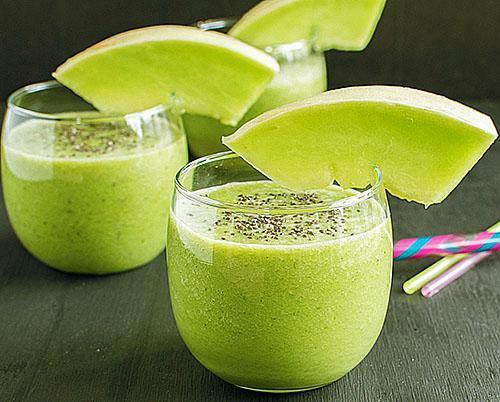Can a nursing mother introduce melon into her diet?
 Pregnancy and, especially, the subsequent birth of a child radically change a woman's life. From now on, everything, starting with the daily routine, ending with the choice of food, is subject to the interests of the little person.
Pregnancy and, especially, the subsequent birth of a child radically change a woman's life. From now on, everything, starting with the daily routine, ending with the choice of food, is subject to the interests of the little person.
If the first changes in the diet occur several months before childbirth, then after them the nursing woman has to reconcile her preferences with the safety of the child, because through milk, toxins and allergens can enter his body.
A nursing mother unwittingly faces a serious problem, because her food should be as varied and healthy as possible, but not pose a danger to the baby who depends on her.
Can melon be breastfed?

Therefore, doctors are wary of this product in the diet of both pregnant women and women who have recently given birth. And to the question "Is it possible to eat a melon for a nursing mother?" doctors sometimes find it difficult to give a definite answer. To understand this issue, you need to evaluate all the positive qualities of the fruit and compare them with the existing risks.
Risks of eating melon for a nursing mom
 The disadvantages of melons when breastfeeding can be considered:
The disadvantages of melons when breastfeeding can be considered:
- an increased content of carbohydrates, which, through breast milk, can provoke the formation of gases in the baby's digestive system and cause painful colic;
- the ability of the melon to cause food allergy symptoms in both the mother and the breastfed baby, expressed in skin rashes and swelling, rhinitis, shortness of breath and itching.
In this regard, it is better to beware and the nursing mother does not eat the melon, at least until the child reaches three months of age, and his immunity does not get stronger a little. Melon is especially dangerous for babies in whom one or both parents are prone to food allergies, even to other types of foods. In such children, acute reactions of the body to exposure to allergens are more common than in babies of healthy couples.
In addition, a mother who is interested in whether a melon can be breastfed should not forget that her own health can be undermined if she is diagnosed with one of the following diseases:
- diabetes;
- gastritis in the acute stage;
- peptic ulcer.
Even with occasional indigestion, which in ordinary life people attach little importance to, in a nursing mother, melon can cause complications and prolonged diarrhea, which affects both the well-being, and the quality of milk, and the health of the baby.
Benefits of Melon for Breastfeeding
 If there are no contraindications, and doctors see no reason to refuse a nursing mother in a melon, one can recall not only the excellent taste of honey fruits, but also the benefits that they can bring to both the woman and the baby.
If there are no contraindications, and doctors see no reason to refuse a nursing mother in a melon, one can recall not only the excellent taste of honey fruits, but also the benefits that they can bring to both the woman and the baby.
Melon is a fruit that contains:
- a large amount of folic acid, which is so important during pregnancy and feeding;
- many other vitamins such as ascorbic acid and beta-carotene;
- vegetable proteins and organic acids, minerals and pectins;
- digestible sugar, which helps to quickly restore the strength needed by a young mother;
- fiber, which helps the intestines, removes toxins and removes excess cholesterol;
- iron and potassium, which support the body against the threat of anemia, cardiovascular diseases, excessive stress on the liver, kidneys and joints.
On the plus side, melon in a nursing mother can cause increased production of breast milk.
The well-organized work of the body and the good mood of the mother are the key to the rapid growth and development of the child, therefore, in moderation and under the supervision of a doctor, it is possible to eat a melon during breastfeeding. Indeed, in addition to the listed advantages, ripe pulp has a mild diuretic effect and imperceptibly cleanses the body of harmful accumulations and fights edema.
When and how can melon be eaten while breastfeeding?
 When cutting a juicy fruit into slices, it is important to remember that in order to avoid unpleasant consequences when eating melon, it is better to follow simple rules:
When cutting a juicy fruit into slices, it is important to remember that in order to avoid unpleasant consequences when eating melon, it is better to follow simple rules:
- Melon should be ripe, high quality and not cold, so as not to irritate the stomach lining when it enters the digestive system. It is not worth, in order to avoid poisoning, a nursing mother to eat a melon, cut in advance and had time to lie in the refrigerator.
- Before use, the melon is washed with a washcloth or a thick sponge in running water and then dried with a soft cloth.
- You cannot eat a melon on an empty stomach or at night, in this case, unpleasant sensations in the stomach cannot be avoided.
- Not worth it eat melon along with products such as rye and wheat bread, pastries, milk and cream, fatty meats and fish.
- As an independent dessert, melons, including melons, are eaten between main meals, for example, after breakfast or lunch as a light snack.
What time of day is it better to eat melon?
 Since it is important for a young mother to see the reaction not only of her body to the introduction of a new product, but also of a baby product, it is reasonable to eat a slice of melon in the morning. In this case, the baby will be supervised all the time, and any alarming symptoms will not go unnoticed.
Since it is important for a young mother to see the reaction not only of her body to the introduction of a new product, but also of a baby product, it is reasonable to eat a slice of melon in the morning. In this case, the baby will be supervised all the time, and any alarming symptoms will not go unnoticed.
If redness appears on the baby's face, a runny nose begins, or other signs of an allergic reaction appear, the mother will be able to quickly turn to specialists for help and take emergency measures. Obviously, in this case, as in a situation when the woman's well-being worsens, the answer to the question: "Is it possible for a nursing mother to have a melon?", Will be negative.
At the first sign of allergy or food poisoning, it is imperative to seek immediate medical attention and remove hazardous substances from the body as soon as possible.
 In addition, the sugars contained in it can become not a source of energy necessary for a woman, but deposited on the waist. And the digestion of fiber takes several hours, so a small slice of melon eaten at night can deprive a woman of good rest.
In addition, the sugars contained in it can become not a source of energy necessary for a woman, but deposited on the waist. And the digestion of fiber takes several hours, so a small slice of melon eaten at night can deprive a woman of good rest.
If the baby does not have a negative reaction to the new product in the nursing mother's menu, you can eat the melon not one slice at a time, but gradually increase the amount to 2-3, constantly monitoring the baby's well-being. The maximum daily portion of melon should usually not exceed 250-300 grams, but even here, in order to avoid acute reactions of the body, it is better to consult with your doctor in advance.
The first months I was very careful in food. First, I ate a small piece of melon - I checked the reaction. And then with pleasure piece by piece. I can advise you to read about the melon while breastfeeding